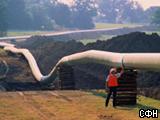|
|
TODAY.AZ / Business
U.S. National Public Radio: "Pipeline faces delays, complaints in Turkey"
20 April 2006 [12:00] - TODAY.AZ

Construction is nearly a year behind schedule and financial disagreements over the project may cause further delays.
Turkish villagers complain that the pipeline has caused damage to their land, and some fishermen along the Mediterranean coast fear tanker traffic will hurt their business.
The pipeline extends for more than 500 miles through Turkey, over snow-capped mountains and past tiny villages.
In the village of Sogutveren, Olcay Alsan, 26, takes care of his family's seven cows. He wears the boots and bright orange jumpsuit he got while working for one month on the construction of the pipeline.
Over a cup of warm, fresh milk, which the family sells, Alsan says he liked the pipeline job and hopes to get permanent work at a pump station up the road.
For the next several hundred miles, the same orange uniform appears on the backs of other farmers and shepherds, who also worked part-time on the pipeline. But not everyone is happy with the project.
In the village of Yurtbasi, farmer Ahmet Yutuk points out the damage he says the pipeline did to his fields.
"What annoys us is there is a kind of invasion on our fields and they are carrying the oil to other countries, selling it to them and giving us nothing," Yutuk says.
Industry analysts, however, are excited about the project. Harvard University's Brenda Schaeffer says that if and when this pipeline begins pumping oil, it may ease world gasoline prices.
"Think about adding the soothing effect of a million barrels a day to the world's market," she says. "Yes, I think this will have a soothing effect and also (reduce) dependency on OPEC."
The Baku-Tbilisi-Ceyhan, or BTC, pipeline is one of the largest international investment projects in recent history in the small former soviet republics of Georgia and Azerbaijan. Not so for Turkey, which dwarfs its smaller pipeline partners both geographically and economically.
Turkey is already crisscrossed by several pipelines that carry oil and natural gas from nearby Iraq, Iran and Russia.
"If you look at Turkey, it's surrounded by energy producers," notes John Roberts, an energy-security specialist. He says these pipelines have turned Turkey into an energy hub, channeling fuel from often-turbulent countries to the West.
But Turkey has its own share of instability, namely, the 20-year conflict with the Kurdish separatist movement called the PKK, which has intensified in recent months.
The BTC pipeline takes a long turn around the Kurdish-populated provinces of southeastern Turkey. British Petroleum executive Norman Rodda says that's been done to reduce the risk of sabotage.
"There's possible terrorism. That's a concern. And also villains who want to steal oil," he says.
The pipeline has faced construction delays, and there may be other complications.
Gokmen Cologlu, of Turkey's state oil company, says his organization is claiming more then $400 million in additional construction fees from international partners in the BTC pipeline consortium.
Cologlu says the pipeline project was the brainchild of the U.S. government -- part of a plan to break the Russian chokehold over Caspian Sea energy deposits.
Matt Bryza is a top U.S. State Department official overseeing energy policy in the Caucasus.
"Until BTC, until the earlier Baku-Supsa pipeline, there was no way to get Caspian oil to global markets other then through Russian-controlled pipelines," Bryza says. "We're not anti-Russia, but it's just a way to cut back on monopoly pressures and increase competition."
Ivan Watson
/www.npr.org/
URL: http://www.today.az/news/business/25345.html
 Print version
Print version
Connect with us. Get latest news and updates.
See Also
- 12 February 2026 [11:20]
Azerbaijan, Ukraine business circles meet at Baku roundtable - 12 February 2026 [10:00]
Azeri Light crude rises to $72.20 per barrel at Italy’s Augusta port - 11 February 2026 [14:20]
How to pay faster with Milliön’s personal cabinet - 10 February 2026 [12:21]
G-77 and China Group hold plenary at UNESCO under Azerbaijan's chairmanship - 10 February 2026 [12:01]
Azerbaijan launches unified digital platform to transform internet services market - 10 February 2026 [10:22]
South Caucasus and Central Asia hold strategic importance for U.S. companies - 10 February 2026 [09:46]
Company registration in Azerbaijan: What entrepreneurs should know before starting - 09 February 2026 [15:42]
Azerbaijani products showcased at int'l exhibitions in Beijing - 09 February 2026 [13:21]
Azerbaijan Cybersecurity Center trains over 380 specialists - 08 February 2026 [21:12]
Georgia seeks to boost regional transit role with major infrastructure push
Most Popular
 United States takes over nuclear security of South Caucasus
United States takes over nuclear security of South Caucasus
 G-77 and China Group hold plenary at UNESCO under Azerbaijan's chairmanship
G-77 and China Group hold plenary at UNESCO under Azerbaijan's chairmanship
 Baku and Washington have passed a verdict on the 907th Amendment
Baku and Washington have passed a verdict on the 907th Amendment
 Defense concludes in Ruben Vardanyan trial, final verdict pending
Defense concludes in Ruben Vardanyan trial, final verdict pending
 AI dominates memory chips, raising phone prices
AI dominates memory chips, raising phone prices
 Reza Deghati's 'Rising Light' exhibition opens at Heydar Aliyev Int'l Airport
Reza Deghati's 'Rising Light' exhibition opens at Heydar Aliyev Int'l Airport
 Georgia targets completion of key transit highway linking Türkiye, Azerbaijan, and Armenia
Georgia targets completion of key transit highway linking Türkiye, Azerbaijan, and Armenia
